Complete List of Top 10 Sheep Breeds in India in 2026

Sheep, with multi-facet usage (for wool, meat, dung, skin, and to some extent milk), play a vital role in the Indian agriculture economy. India has the second-largest number of sheep after China and boasts many indigenous breeds. The popular Sheep breeds in India are Nellore, Deccani, Marwari, Bellary, Jaisalmeri, etc. In this blog, we will discuss the popular sheep breeds in India, including their characteristics and other details.
Table of Contents
Overview of Sheep Breeds in India
Sheep are India's second most important ruminant after goats. Forty-four registered and documented breeds of sheep exist. According to the 20th Livestock Census, the total number of Indian sheep in the country is approximately 74.26 million, which is 14.1% higher than the previous Census and accounts for 13.83% of the total livestock population in India. The top five states in terms of sheep population in India are Telangana, Andhra Pradesh, Karnataka, Rajasthan, and Tamil Nadu.
According to the UN's FAOSTAT 2019, India ranks second in terms of sheep population, representing approximately 4.03% of the global sheep population. In India, sheep are spread over varied ecological conditions, resulting in a wide range of phenotypes and production-type sheep breeds.
Which are the Top 10 Sheep Breeds in India in 2026?
The top 10 sheep breeds in India are Nellore Sheep, Deccani Sheep, Marwari Sheep, Bellary Sheep, Jaisalmeri Sheep, Mecheri Sheep, Chokla Sheep, Garole Sheep, Mandya Sheep, and Kendrapada Sheep. India is home to a diverse range of foreign and Indian sheep breeds. Let's discuss these top sheep breeds in detail:
Nellore Sheep
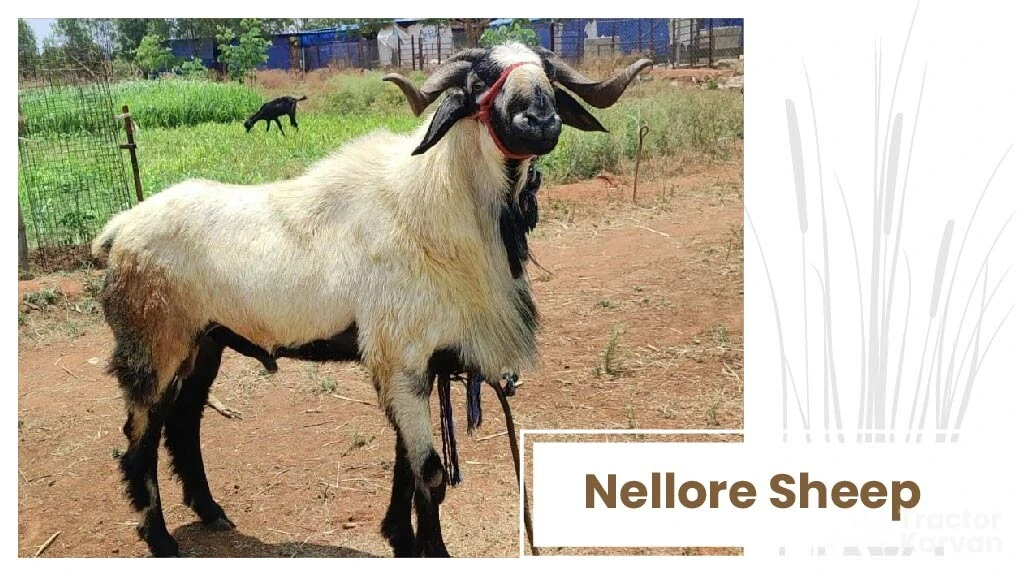
The Nellore Sheep breed is primarily found in the Nellore district and its adjoining areas, including those of the Prakasam and Ongole districts in Andhra Pradesh. Three distinguished varieties of Nellore Sheep are found based on colour: Palla, Jodipi, and Dora.
These breeds are primarily reared for meat and are the tallest sheep breed in India. Some of the key characteristics are:
- The colour of Nellore sheep is completely white, white with brown/black spots on the head, or completely brown.
- They have very little hair except on the wither, brisket, and breech.
- They have long and drooping ears, and most of the breed carry wattles.
- The male and female Nellore sheep have an average body weight of 36 kg and 28 kg, respectively.
Deccani Sheep
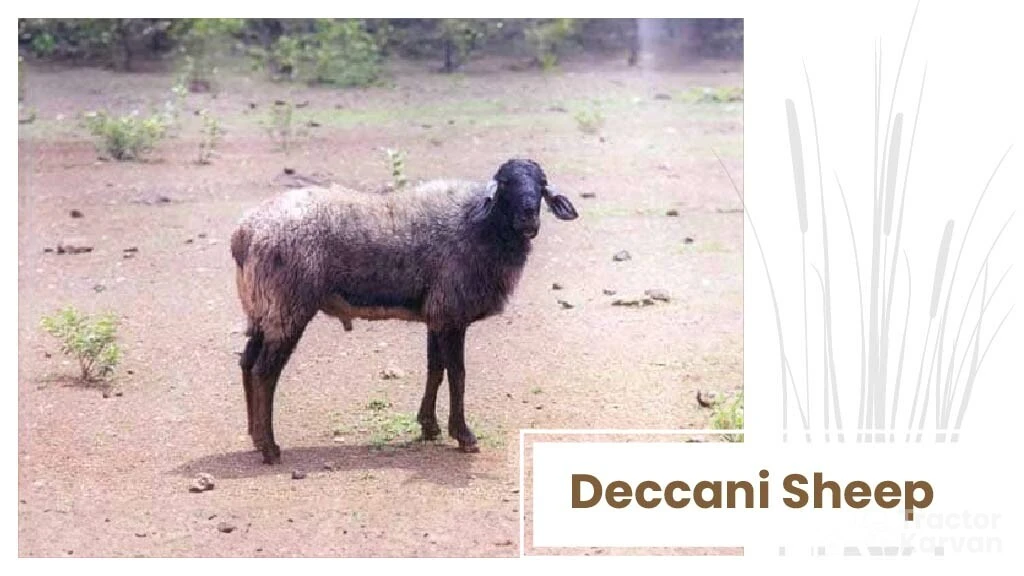
The Deccani Sheep breed is mainly found in the Deccan Plateau, encompassing the states of Karnataka, Maharashtra, and Andhra Pradesh. Four different strains of Deccani Sheep are Sangamneri, Lonand, Kolhapuri, and Solapuri (Sangola).
These sheep breeds are a combination of hairy types from Tamil Nadu and Andhra Pradesh, and woolly types from Rajasthan. Besides, they possess natural resistance to many common diseases. Some of the key features are:
- They are small, hardy, and well-settled in poor pastoral conditions.
- They have coloured fleece, grey and black colours being more dominant.
- The Deccani sheep breed has an annual yield of wool being 4.54 kg per sheep.
- They produce low-grade wool and are chiefly used to manufacture rough blankets (Kambals).
- The flocks of this sheep breed are maintained primarily for mutton.
Marwari Sheep
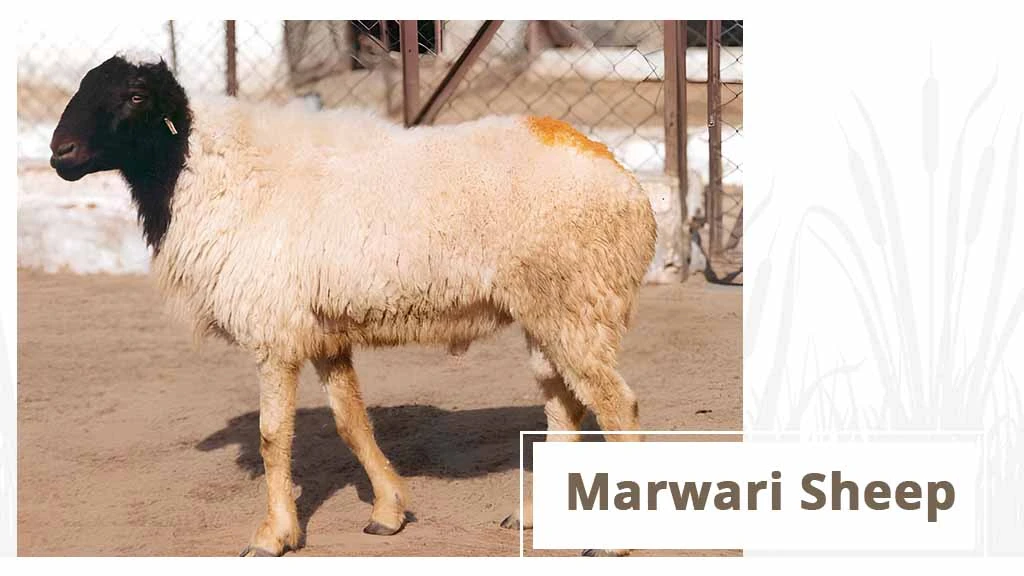
Marwari is an important sheep breed of Marwar region covering Jodhpur, Nagaur, Jalore, Sirohi, Pali and Barmer districts of Rajasthan. This breed is also found in the Jeoria region of Gujarat. These breeds are migratory and are known for their resistance to heat and temperature. Some of the key features are:
- Rebari communities, who are migratory pastoralists, rear these sheep.
- They are well built, strong and medium in size.
- The face of Marwari breed is usually black, extending up to the neck.
- The ears of these sheep are tubular, and the tail is short to medium & thin.
- The weight of adult male sheep ranges from 24 – 47 kg, and that of females ranges from 18 – 43 kg.
- They are reared for their meat and wool (for making carpet).
- They possess high resistance to disease and worms.
- The yield of wool per year is 0.90-1.81 kg per animal.
Bellary Sheep
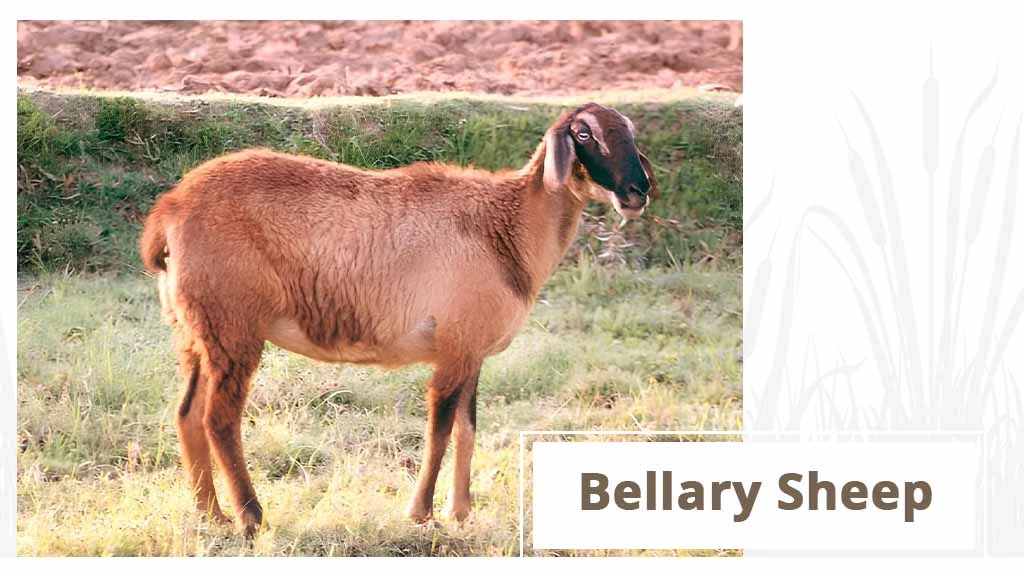
Bellary is the most important sheep breed in Karnataka in terms of population because of its adaptability to the black soils and agroclimatic conditions of the northern part of the state. They are primarily found in Bellary and Davangere districts and adjoining areas of Chitradurga & Haveri districts of Karnataka.
These sheep breeds are not much different from Deccani sheep. The breed found to the north of the Tungabhadra River is called Deccani, and those to the south of it are called Bellary. Some of the key features are:
- They have strong builds and are medium to large in size.
- The colour of the coat ranges from black-white combinations to complete black.
- Most of the rams (male sheep) are horned, whereas ewes (female sheep) are polled.
- The horns are thick at the base and pointed as they emerge upward, curling backwards.
- Ears of this breed are tubular in shape and medium in size.
- The tail is short and thin.
Jaisalmeri Sheep
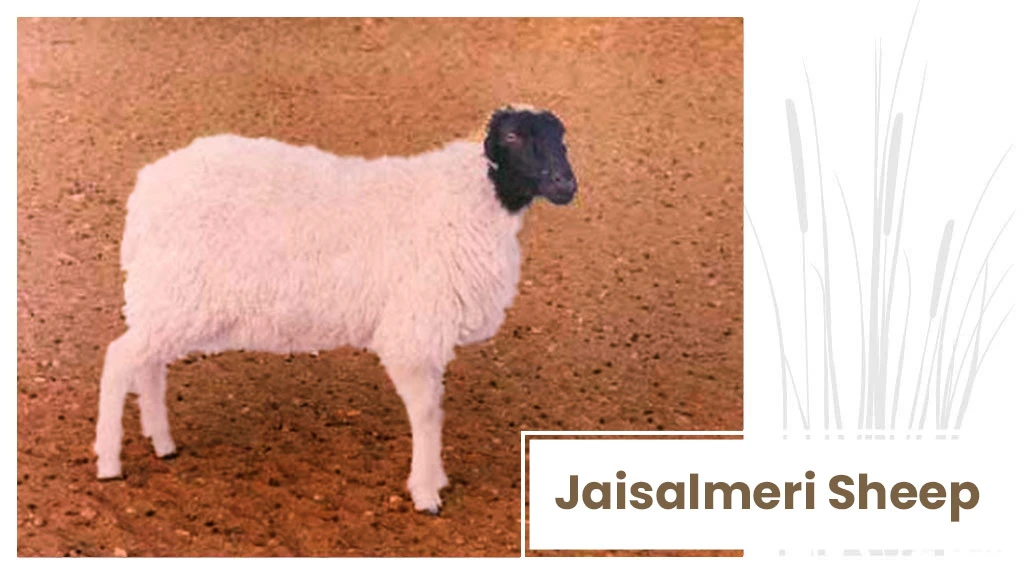
These sheep breeds are endemic to Jaisalmer in Rajasthan and are also found in the neighbouring districts of Barmer and Jodhpur. The Raika Hindus raise them under a migratory and semi-nomadic system.
They can survive extreme heat (up to 50°C) and require minimal water intake. They produce good carpet-type wool, and some of the physical characteristics are:
- The fleece colour is white, and their faces are black.
- They have long and drooping ears.
- The horns of the male and female are polled.
- They have a square build and are deep and tall in appearance.
- They are one of the heaviest sheep breeds in India, with the average weight of adult rams being 54.15 kg.
Mecheri Sheep
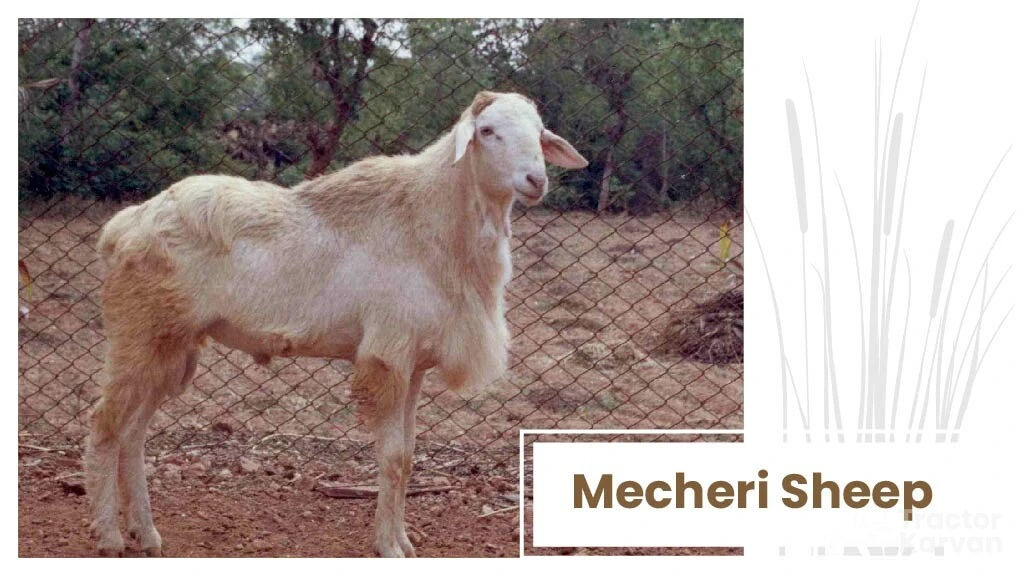
Mecheri sheep are native to the Salem and Coimbatore districts of Tamil Nadu. They are also found in Namakkal, Karur, Erode, and certain parts of the Dharmapuri district. Mecheri sheep are known for their skin quality, which is the best among all sheep breeds in India.
The vital physical features are:
- The Mecheri sheep breed has no horns for both males and females.
- The average body weight of an adult male is 36 kg.
- The average body weight of adult females is 22 kg.
- They have medium-sized bodies and contain pale, purplish skin colour.
- The tail of this sheep breed is more petite and slender.
Chokla Sheep
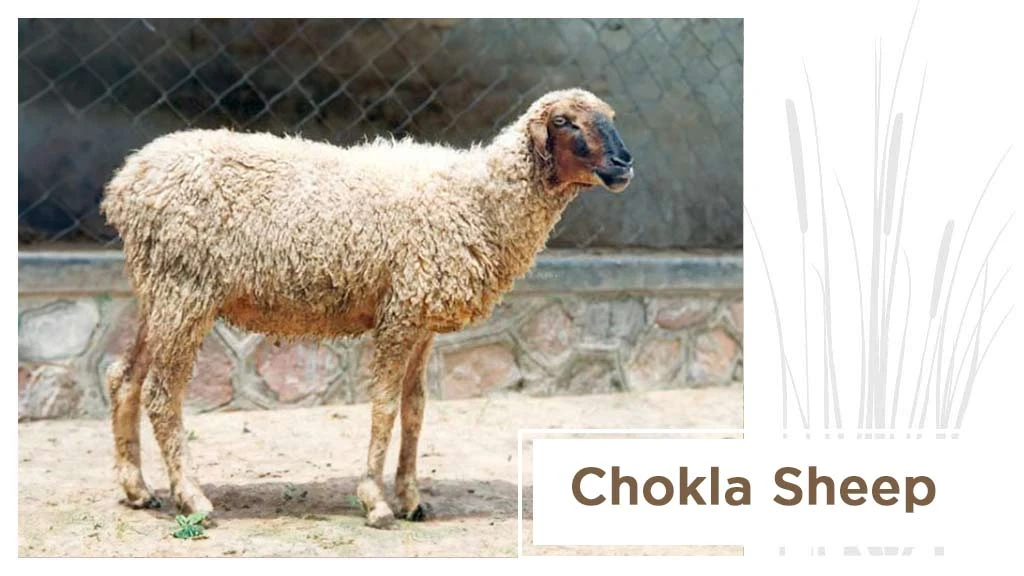
The Chokla Sheep breed hails mainly from the Churu and Sikar districts of Rajasthan. It is also distributed over the adjoining areas of Nagaur, Bikaner, and Jaipur. These sheep breeds are reared for their wool, which is used to make fine carpets, and for their migration quality.
The Chokla breed produces the finest carpet wool among all Indian Sheep breeds. Its wool quality number, which indicates the fineness of wool based on the average diameter of fibres, ranges from 54s to 60s count. Some of its key features are:
- They are light and medium-sized.
- The face does not have wool, and the colour is dark brown or reddish brown.
- They have tubular ears, with ear length ranging from small to medium.
- They have thin tails, and the length is medium.
- They have relatively fine and dense coats covering the entire body, including the belly.
Garole Sheep
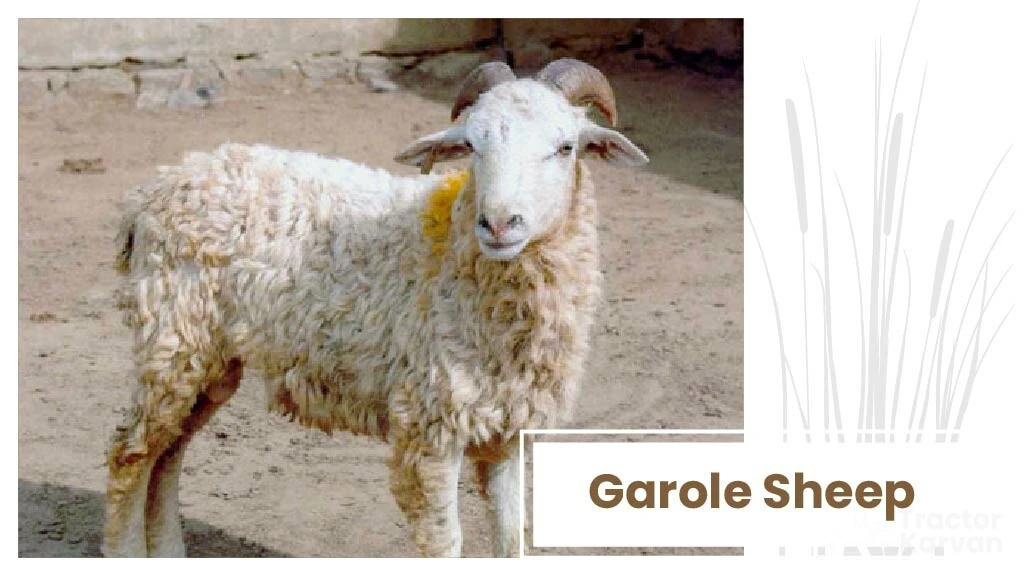
The Garole sheep breed is native to the Sunderban region of West Bengal. These sheep are known for their prolificacy and have a high reproduction rate. They are the prolific microsheep of India.
Garole sheep are suitable for hot and humid climates. They are primarily reared for meat, and their wool is used for manufacturing rough carpets. Some of the unique features are:
- They can breed year-round and are disease-resistant.
- They can graze in knee-deep marshy saline areas.
- They are small in size and have a low body weight.
- They have square bodies with small heads, medium ears, and short, thin tails.
- The average body weight of male and female sheep is 15 kg and 13.7 kg, respectively.
- Multiple births are common in this breed.
- The fleece is open, coarse and very dense.
Mandya Sheep
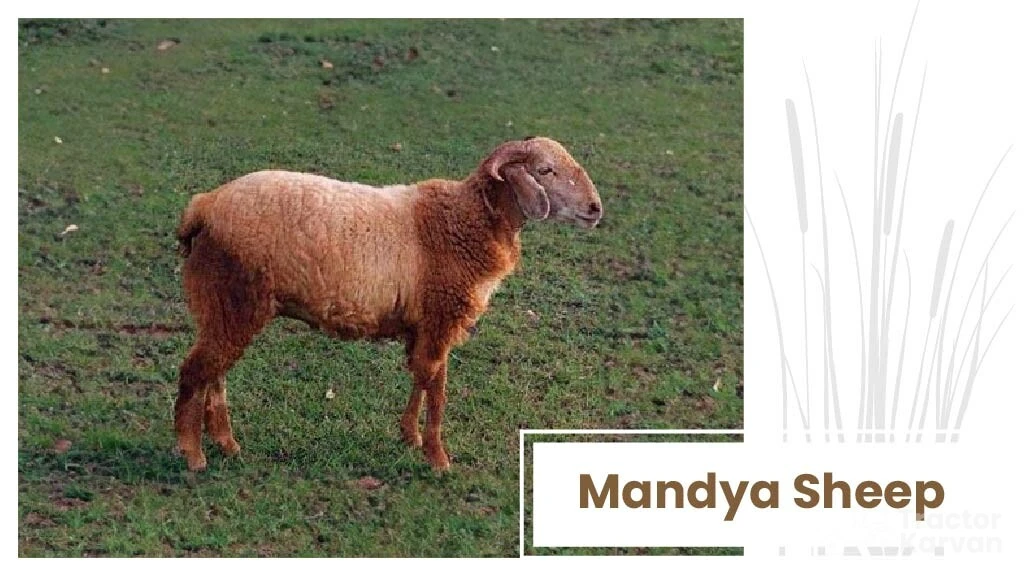
Mandya Sheep are native to the Mandya district and the border areas of the Mysore district of Karnataka. They are raised for meat and wool production. This breed is best known for its mutton among all Indian sheep breeds. The key physical features are:
- They are white, and the face colour is light brown.
- The horns of male and female Mandya sheep are polled.
- They have a compact body with a typical reversed "U" shape from the back.
- They have long, leafy, and drooping ears.
- Their tail is short and thin, and most sheep carry wattles.
Kendrapada Sheep
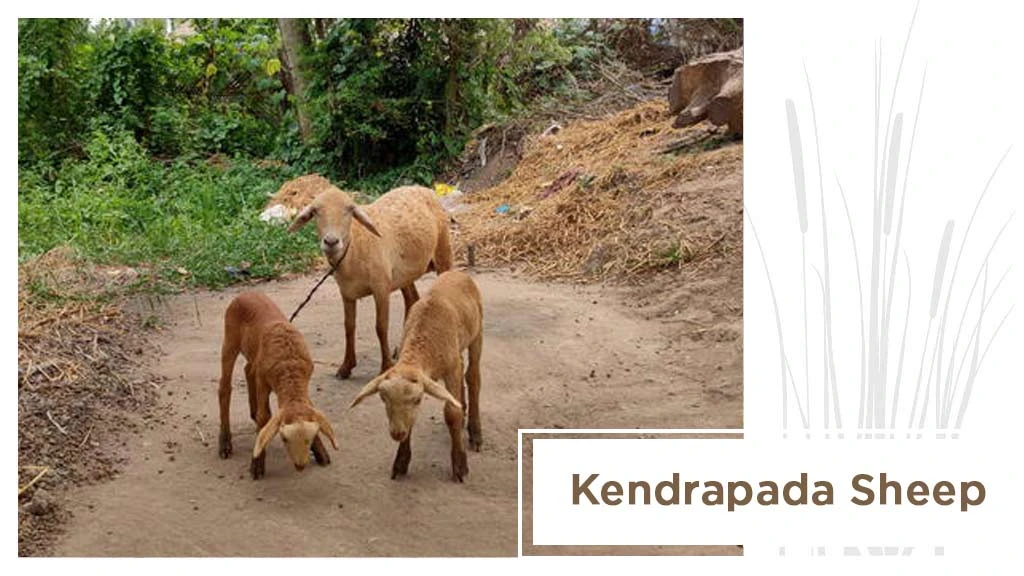
The Kendrapada Sheep breed is native to the Kendrapada district of Odisha and is distributed in the Konark, Bhadrak, and Puri districts of coastal Odisha. They are identified for their prolificacy, second only to Garole Sheep. They are the second sheep breed in India to carry the FecB mutation. They are primarily reared for meat. The key physical features are:
- The average body weight of the adult Kendrapada sheep breed is about 23 kg.
- The colour of the coat ranges from dark brown to white.
- There are button-type horns in some male sheep.
- They have horizontal ears and a short, straight and drooping tail.
Conclusion
Sheep are an important animal in the Livestock Sector in India. They provide livelihood to small and marginal farmers and landless labourers. India is home to 44 sheep breeds, which are distributed across various ecological conditions. Indigenous sheep make a significant contribution to the agrarian economy, particularly in areas where crop and dairy farming are not economically viable. They provide a dependable source of income to the animal owners. If you want to explore more related to the livestock sector and other breeds, such as the Best Goat Breeds in India.
Frequently Asked Questions On Top Sheep Breeds in India
1. How many breeds of sheep are found in India?
Around Forty-four breeds of sheep are found in India.
2. Which is the best sheep breed in India?
The best sheep breed in India is the Nellore sheep.
3. Which sheep breed is best for meat?
The Mandya sheep breed is considered the best breed for meat production.
4. Which sheep breed is best for wool production?
The Chokla sheep breed is the best for wool production.
5. What is the duration of sheep breeding?
Breeding ewes of indigenous breeds should be 18 to 24 months old, depending on their body condition.
6. What is the purpose of cross-breeding of sheep?
The primary purpose of cross-breeding in sheep is to achieve the desirable characteristics of two or more breeds.


Related Blogs











